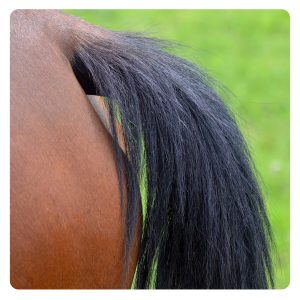
Summer eczema is a very annoying problem.
Many horses suffer from it, but fortunately you can take some measures to limit the damage.
This is great for horses who go crazy with itching and owners who hate to see those beautiful mane and tail disappear.
Summer eczema is caused by an allergic reaction to a protein found in the saliva of the dreaded culicoides mosquito (midges).
Immune cells release enzymes into the skin, causing the reaction.
The tissue inflammation that follows causes irritation of nerve endings in the skin and this sends itch signals to the brain.
The damage caused by abrasion often causes secondary bacterial infections as well.
Mane and tail are the most affected areas and, as with many allergic conditions, this worsens as your horse ages.
This is because the immune system has a memory and quickly remembers the previous year’s enemy.
Fortunately, there are a number of steps you can take to minimize the damage:
– Very important for a well-functioning immune system is a healthy body that is free of excess waste products.
A detox cure after winter is therefore especially recommended for horses with summer eczema.
– It is crucial to optimize gut function, because good immunity starts in the gut.
Extra attention is needed for a good source of essential fatty acids.
These are essential for the entire body, but in summer eczema they have an important role in regulating the inflammatory process and repairing damaged skin cells by improving skin elasticity.
– External management through protective blankets and treatments of the affected areas is, of course, also very important.
Start these measures early, as the first mosquito eggs are already laid at a temperature of 10 degrees.
Florian Golden Herbs is a nice detox cure and Florian Vitaflor helps your horse support the immune system.
All Florian roughage mixes and concentrate feeds contain a wide variety of fiber sources, for optimizing gut flora and a high proportion of fats.
Author: Dr. Hilde Vrancken
Vet
Discount Applied Successfully!
Your savings have been added to the cart.